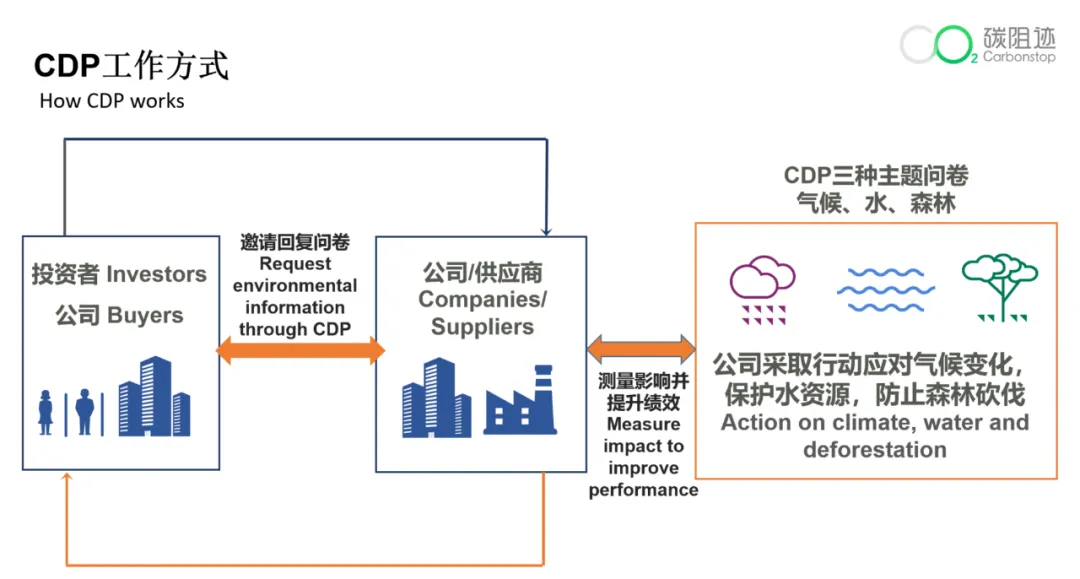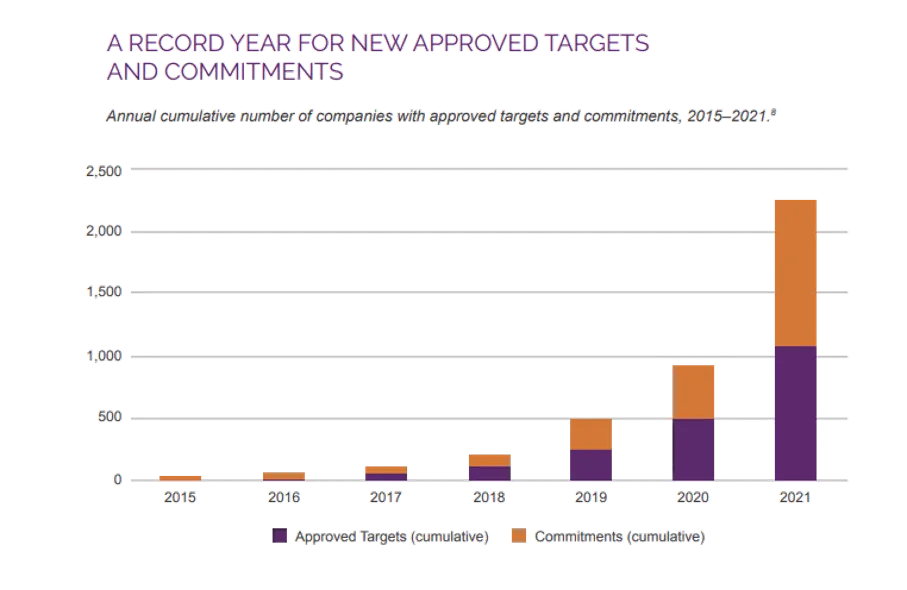There are only two months left before the CDP reporting for 2023 concludes. How is your CDP questionnaire preparation coming along?
Facing the myriad challenges brought about by the global climate crisis, green and low-carbon, sustainable development has become the mainstream consensus worldwide. Both domestically and internationally, across various industries, there is a trend toward aligning with the carbon neutrality track, enhancing carbon management capabilities, and conducting comprehensive carbon disclosure, which is gradually becoming an opportunity and challenge for businesses.
Among these, the Carbon Disclosure Project (CDP), Science-Based Targets initiative (SBTi), and Race to Zero are currently the most widely recognized forms and are the most commonly adopted by companies in their carbon neutrality practices.
01 Carbon Disclosure Project (CDP)
CDP is the world's largest environmental information platform, with the richest and most comprehensive database, and it has been rated as the top climate research institution by investors.

CDP primarily consists of three types of thematic questionnaires: Climate Questionnaire, Water Questionnaire, and Forest Questionnaire. If a company completes all three questionnaires and scores an A in each, it receives a 3A rating. However, typically only 2% of companies make it to the A list, and even fewer achieve a 3A rating.
In December 2022, the CDP corporate questionnaire rating results were announced, with over 18,000 companies disclosing their environmental information through CDP, marking a 233% increase from 2015 when the Paris Agreement was signed, setting a historical record. Among them, 330 companies were included in the annual CDP A List, such as L'Oréal, HP, Google, Microsoft, and Chinese companies like Huawei and Want Want also made the list.
Why do global renowned companies enthusiastically engage in CDP disclosure? The CDP score clearly reflects a company's current level of environmental management and, more importantly, it guides the company on what actions to take next. For example, most companies that received an A rating have also set reduction targets aligned with the "Science-Based Targets Initiative" (SBTi).
02 Science-Based Targets (SBTi)
The Science-Based Targets initiative (SBTi) is a global initiative jointly launched by the World Wildlife Fund (WWF), the World Resources Institute (WRI), and the United Nations Global Compact (UNGC). It is part of the We Mean Business Coalition.
If a company's greenhouse gas reduction targets meet the levels required to achieve the goals of the Paris Agreement (limiting global average temperature rise to well below 2°C above pre-industrial levels and striving to limit the increase to 1.5°C), these targets are considered the company's science-based targets.
The process of setting science-based targets generally involves four steps: submitting a commitment letter, setting science-based targets, submitting the targets for SBTi review, and publicly announcing the science-based targets.
The target time frame is usually 5-10 years. For example, targets submitted in 2022 would have target years between 2027 and 2032. The reduction scope includes the company's Scope 1 and Scope 2 greenhouse gas emissions. If Scope 3 emissions exceed 40% of total emissions, then Scope 3 reduction targets must also be set.
After setting science-based targets, companies need to publicly disclose their progress annually. Disclosure formats include CDP, annual reports, sustainability reports, and company websites.
03 Race to Zero
Race to Zero is a global campaign supported by the United Nations, calling on non-state actors, such as companies, cities, regions, financial, educational, and healthcare institutions, to take immediate action to halve global carbon emissions within a decade and build a healthier, fairer zero-carbon world to achieve the goals of the Paris Agreement.
The campaign primarily consists of five parts: committing at the organizational leadership level to achieve (net) zero greenhouse gas emissions as soon as possible, publicly disclosing a transition plan within 12 months of joining, taking immediate action through all implementable pathways, reporting progress on targets at least annually, and actively advocating for peers and stakeholders to join the effort to achieve global (net) zero emissions.
Currently, 63% of global emissions are covered by net-zero targets, and companies that have committed to Race to Zero already represent 12% of the global economy and $9.81 trillion in revenue.
04 Why Should Companies Participate in These Programs?
The carbon neutrality market is a blue ocean market for the future, and low-carbon transformation is bound to become a new growth point for companies in the wave of carbon neutrality. To keep up with the trends and gain more market recognition, companies must find entry points or convergence points to enter the carbon neutrality field based on their industry characteristics, and carbon disclosure and target setting are often the first steps.
For example, many manufacturing companies serve as suppliers to brand companies, which directly face end consumers and need to establish a good brand image to attract more customers. Therefore, setting carbon reduction and carbon neutrality targets that align with their own development and delivering excellent ESG performance is a way for brand companies to fulfill their social responsibilities. Green and low-carbon products from these companies will also capture a larger consumer market.
Supplier companies, influenced by the reduction targets of brand companies, are often required to conduct rigorous carbon disclosure. Some leading brand companies even require suppliers to achieve an A rating in CDP within a certain period. For supplier companies, early carbon disclosure and obtaining an excellent score can result in more orders from brand companies.
Beyond supply chain requirements, companies that perform well in sustainability or ESG areas are also more likely to gain capital market recognition, such as better stock performance or easier access to investment funding. Additionally, many industries are influenced by policy factors. For instance, after the implementation of the EU carbon tariff policy, export-oriented companies must enhance their carbon management capabilities or risk losing orders and market share.
05 Secrets to Success for Companies
Many companies have already recognized the importance of low-carbon transformation and have started implementing actions, such as CDP carbon disclosure, setting carbon reduction and carbon neutrality targets, etc.
However, for companies that are new to these processes, the complex and opaque content can be overwhelming, making it difficult to grasp the key points and understand the complicated procedures and rules. After investing significant time and money, the results may fall short of expectations. In such cases, it might be beneficial to seek professional carbon management consulting services.
Since 2013, Carbonstop has been engaged in CDP-related business, including CDP questionnaire guidance, science-based target setting, SBTi guidance, annual carbon emission inventory, ISO14064 audit assistance, energy-saving and emission reduction target setting, carbon neutrality target path planning, corporate climate change risk and opportunity analysis, and supply chain questionnaire filling and other consulting services.
Over years of client service, Carbonstop has accumulated rich industry experience and gathered numerous seasoned carbon management consultants. Carbonstop has served over 1,200 companies, including more than 100 Fortune Global 500 companies. CDP clients include Shenma Industries, Rongwei International, Huaxi Biotech, Shandong HaiLong, and others, covering industries such as packaging, technology, chemical production, biomanufacturing, clothing trade, and semiconductors.
All of Carbonstop's CDP clients have achieved B-level ratings or higher, with many reaching leadership levels (A or A-). In 2022, Carbonstop successfully helped Baidu improve its CDP rating from D to B, earning the company the CDP Leap Forward Award. Carbonstop also successfully assisted suppliers of Walmart and Disney, such as Seasons, in joining the Science-Based Targets initiative (SBTi).
Therefore, finding the right approach can make a big difference.
If your company needs assistance with CDP questionnaire filling, climate risk analysis and assessment of its financial impact, questionnaire guidance and training, solving Scope 3 category inventory challenges, joining the Science-Based Targets initiative, setting 1.5°C science-based reduction targets, and more, please feel free to contact us.






